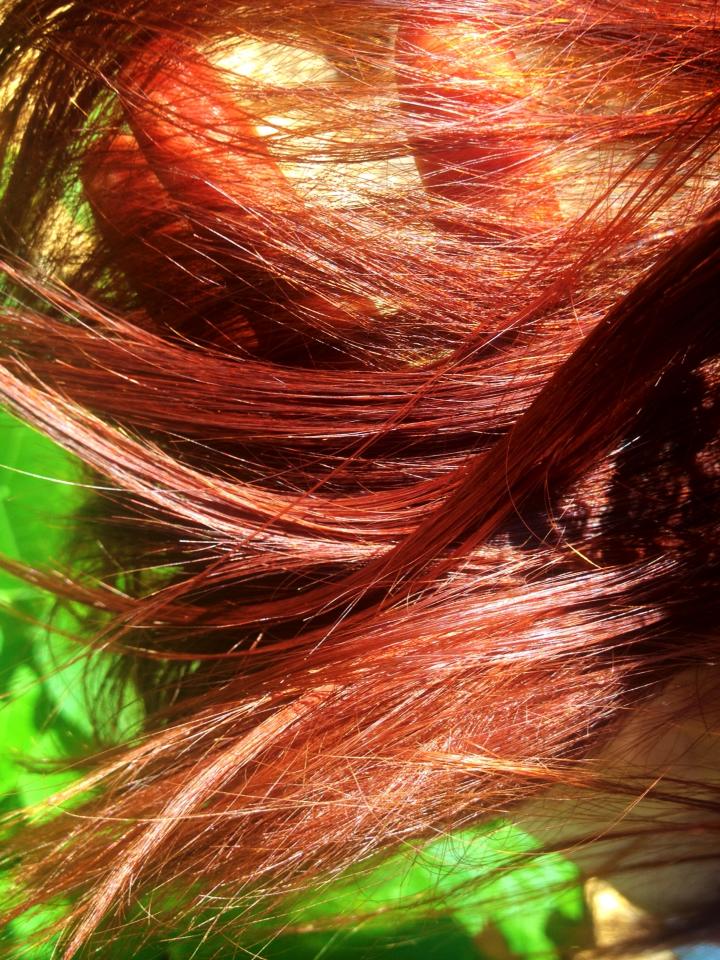
Everything Hair Henna & Indigo
Everything you need to know about dying your hair with henna and indigo for beautiful natural healthy hair color.
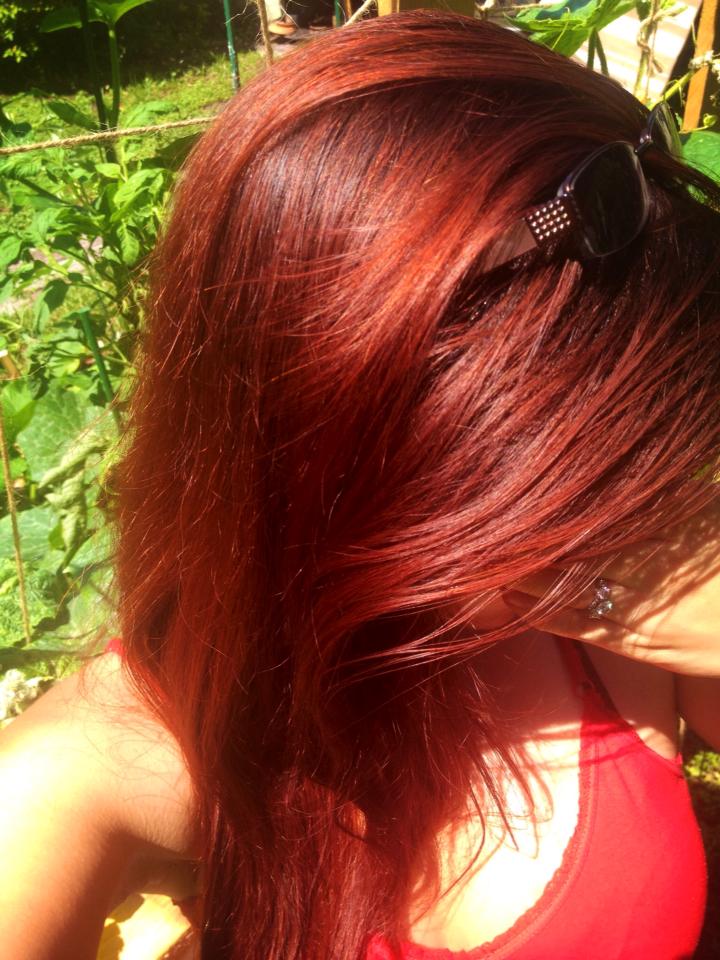
Henna & Indigo: Natural Hair Dyes
Henna and/or indigo have been coloring hair for over 6000 years! It's a beautiful, safe, and healthy way to switch up your hair color. But there are plenty of misinformation out there about using henna on your hair. Let's clear up some of those misconceptions!
-
Using Henna and Over Hair Dye
You might have heard that you can't apply henna over already dyed hair or use regular hair dye after henna. That's not entirely accurate.
You can safely use high-quality natural body art henna (BAQ) on previously colored or bleached hair. Additionally, you CAN color over hair previously dyed with natural BAQ henna. However, it's crucial to avoid using commercial hair dyes with adulterated or poor-quality henna.
Body art quality henna, if sourced from reputable suppliers, is pure and won't react negatively with chemical hair dyes. On the other hand, henna labeled as "hair henna" often contains metallic salts, lead, and other chemicals that can cause severe reactions when mixed with chemical dyes, potentially damaging or even "melting" your hair.
To avoid problems, stick to high-quality BAQ henna and pure indigo like ours. These natural products offer various benefits for your hair.- Henna is a natural conditioner and hair strengthener.
- Reduces or eliminates dandruff and is and effective natural treatment for lice.
- Henna is permanent and does not fade as much as typical red dyes.
- Henna/indigo yields a natural looking color with natural highlights.
- Great for men to use on both hair and beards.
- For deeper color you can reapply henna and indigo as often as you like. Most people re-dye every 3-6 weeks.
- If you have curly hair, henna may loosen your curl pattern.
- Allergies to henna and indigo are extremely rare, but as with all hair dyes, you should still do small skin test before using.
- Do not use indigo if you have mold allergies.
-
What Color Will It Be?
Henna is red. Any henna labeled as any other color is mixed with something other than henna. Henna is a transparent dye, so it will NOT lighten your hair. Just like henna on the skin, henna uses the color of the hair as it's color base.
- If you have white-blond (natural or bleached) or gray hair, you will get a super bold red color.
- If you have light brown hair, you will get a brown/auburn color.
- If you have dark brown or black hair, you will get glossy red highlights in the sun.
All hair gets a glossy natural-looking color with natural highlights and lowlights with BAQ henna. Henna covers gray beautifully and naturally!
You can get other colors (such as black or browns) naturally by mixing BAQ henna with high-quality indigo. Read below for instructions on using a combination of henna and indigo to achieve browns and blacks. -
How Much Do I Need?
Always get a little extra, just in case!
- Short Hair (Chin Length) = 50-100 grams
- Shoulder Length = 100-200 grams
- Mid Back Length = 200-300 grams
- Waist Length = 300-500 grams
If you have exceptionally thick hair, add a bit more. If you have curly hair add much more! Any henna you don't use can be frozen for later use or for use in a henna gloss.
*TIP* To save money, buy henna by the kilo or buy indigo by the kilo. Unopened henna or indigo powder is good for 3 years if stored in a cool dry place. You can even mix larger batches and freeze extra henna in individual sized "servings" for later use.
Make note, though indigo powder keeps for a long time, once mixed into a paste, indigo CANNOT be frozen and must be used right away.
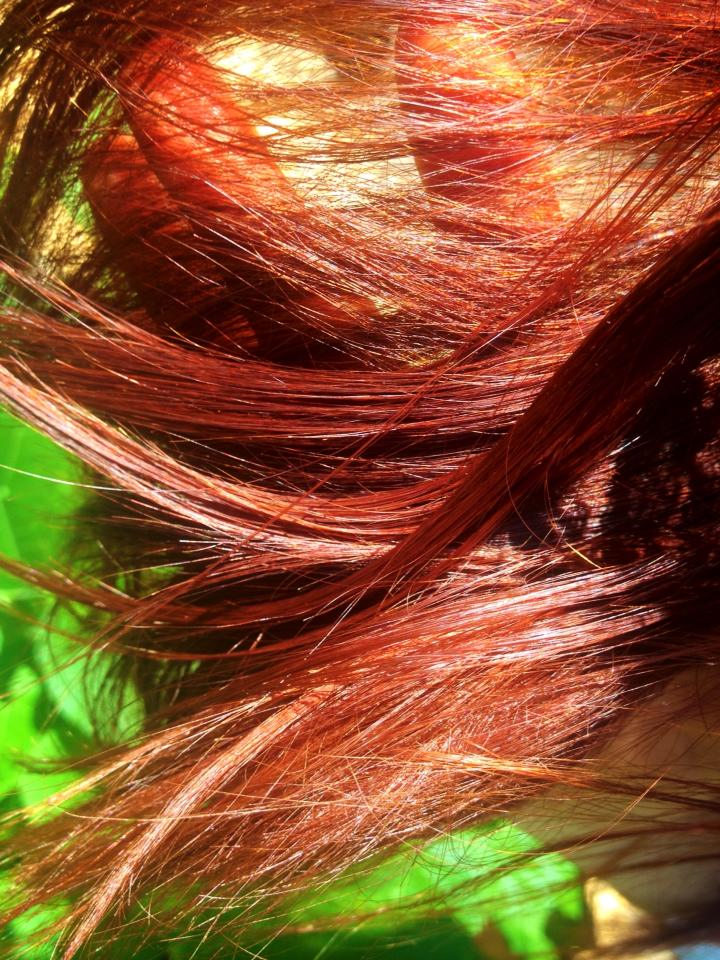
How to Mix Henna for Hair
This is an easy and reliable hair henna recipe. Remember, henna works with your hair color, so try a small test before applying it all over.
Here's how:
- Mix henna powder with lukewarm water until it's like thick yogurt.
- Let it sit for 2-6 hours (or 3-8 hours for Jamila henna) to release dye.
Some tips:
- For stubborn grays, use half lemon juice and half water.
- If you used lemon juice, let henna sit an extra hour for dye release, then condition after.
- If your hair is thick, add sugar to the mix for easier application and rinsing.
- Dislike the smell? Add a teaspoon of ginger powder to neutralize it.
- Use essential oils sparingly to change the scent (seriously, like a drop or two).
- Extra paste can be frozen or made into a henna gloss.
- Need henna faster? Use warmer water for quicker dye release.
- If you have curly hair, henna may loosen your curl pattern.
- The vast majority of people benefit with softer better conditioned hair from henna, but some people report that henna will dry their hair out. To prevent this, simply deep condition your hair after dying, and do not mix your henna with lemon juice.
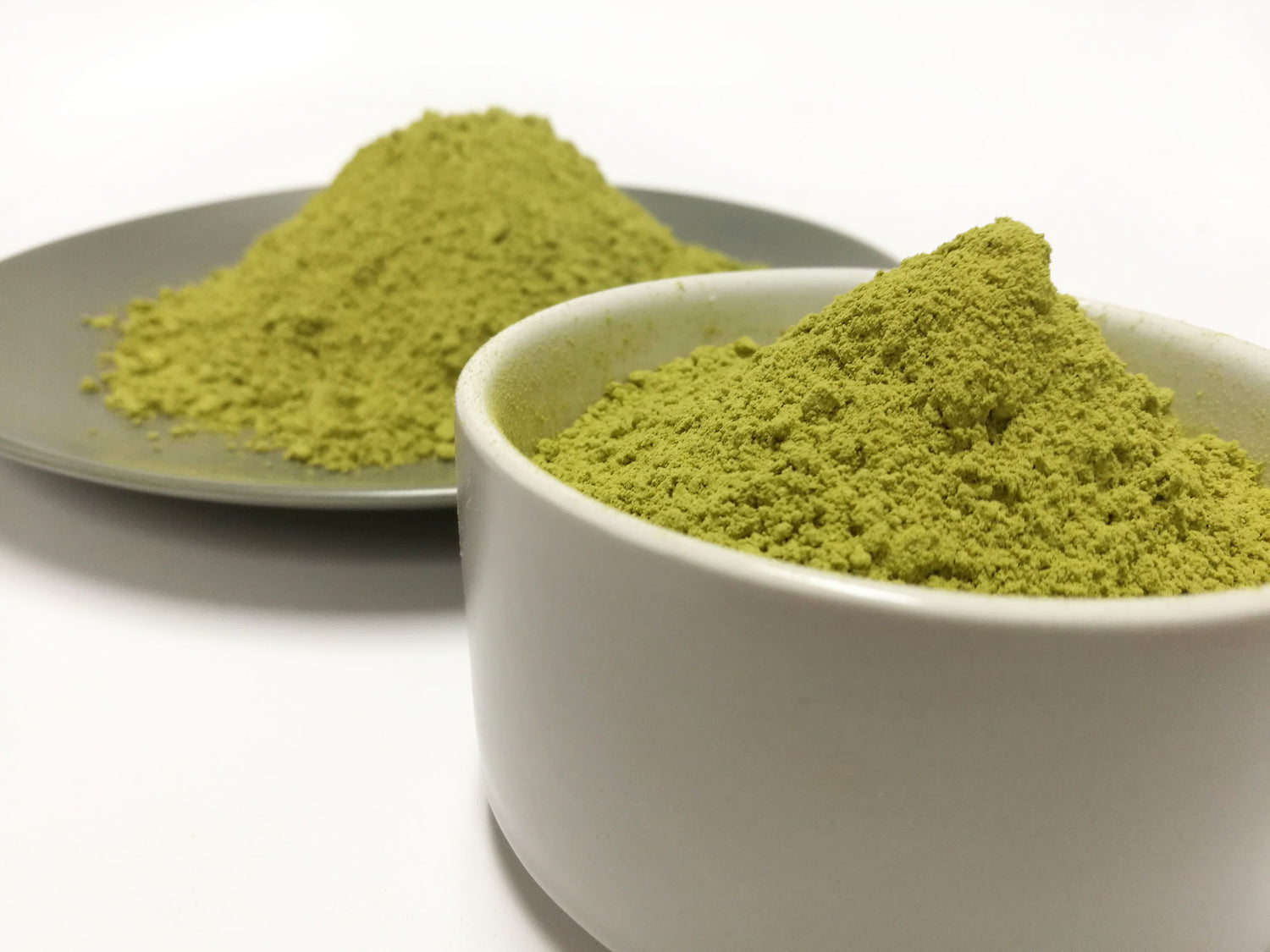
How to Mix Indigo
Indigo powder should only be mixed with water. Do not use any other liquids or it will affect its dying ability.
Here's how to mix indigo:
- Mix indigo with warm water until it's a bit thicker than yogurt. Go slowly, as indigo can thin out fast.
- Let it sit for 15 minutes to release dye.
Some tips:
- For stubborn grays, add a teaspoon of salt for every 50 grams of indigo.
- If you use hot water, you can use the indigo right away. Just don't make it too hot, or you'll overcook the indigo.
- Mix only what you need, as extra paste can't be saved for later.
- Individuals with mold allergies should avoid using indigo.
Instructions for Different Hair Colors
Henna and indigo offer a variety of colors, depending on how you use them. They don't lighten hair, so the outcome depends on your hair's current color.
Before applying, do a strand test in a hidden area or use hair from your brush to check the color.
While allergies to henna and indigo are rare, as with any hair dye, do a small skin test before using.
Do not use indigo if you are allergic to mold.
Collapsible content
To Get Red Hair - Henna Only
For a red hue, use henna. The lighter your hair, the redder it'll turn out.
- On very light hair like white blond or gray, it'll be a bold coppery red.
- Light brown hair will get an auburn shade, varying in darkness.
- Dark brown or black hair will have red highlights when in sunlight.
To apply henna for red tones:
- Mix henna powder with lukewarm water until it's like yogurt (but not too drippy).
- Let this paste sit for 2-4 hours (3-6 hours for Jamila henna) to release dye.
- Wear gloves and apply it thickly to clean, dry hair.
- Cover hair with a plastic cap and press it down.
- Remove any henna on skin. It WILL stain.
- Let it soak on the hair for 2-6 hours. The longer you leave it in, the richer color.
- Rinse without shampoo but use conditioner.
- Optionally, blow dry for 10-15 minutes to set color.
Important! This is not the final color of your hair. The color will oxidize over the next 1-3 days to reach its final color.
To Get Brown Hair - Henna & Indigo
You can achieve various brown and red shades by mixing henna and indigo together.
To do this:
- Mix henna powder with lukewarm water until it's like thick yogurt.
- Let it sit for 2-4 hours (3-6 hours for Jamila henna) to release dye.
- After henna has released dye, mix indigo with warm water until it's very thick, then let it sit for 15 minutes.
- Combine the henna and indigo pastes.
- Apply the mixture to clean, dry hair, covering every strand.
- Cover hair with a plastic cap and press it down.
- Remove any paste from skin.
- Let it soak on the hair for 2-6 hours. The longer you leave it in, the richer color.
- Rinse without shampoo but use conditioner.
- Optionally, blow dry for 10-15 minutes to set color.
Important! This is not the final color of your hair. The color will oxidize over the next 1-3 days to reach its final color.
The more indigo you use, the darker brown your hair will be. Some experimentation may be in order to find the perfect shade of brown for you and your hair.

To adjust the shade:
- For reddish brown, use three or four parts henna to one part indigo.
- For brown, use equal amounts of henna and indigo.
- For dark brown, use one part henna to three or four parts indigo.
To reduce redness without going fully brown, add indigo gradually until you achieve the desired shade. The color outcome depends on your hair's natural color.
To Get Black Hair - Henna & Indigo
For a deep black color, use this two-part application process. First, apply pure henna, then immediately after, apply pure indigo.
Step 1: Henna Application
- Mix henna powder with lukewarm water until it's like yogurt (but not too drippy).
- Let it sit for 2-4 hours (3-6 hours for Jamila henna) to release dye.
- Wear gloves and apply henna to clean, dry hair, covering every strand.
- Cover hair with a plastic cap and press it down.
- Remove any henna from skin.
- Let it soak on the hair for 2-6 hours. The longer you leave it in, the richer color.
- Rinse WITHOUT shampoo or conditioner.
- Towel dry hair.
Step 2: Indigo Application
- Mix indigo powder with warm water until it's like thick brownie batter.
- Let it sit for 15-20 minutes to release dye.
- Apply indigo to freshly hennaed hair (clean and dry), covering every strand.
- Cover hair with a plastic cap and press it down.
- Remove any indigo from skin.
- Let it soak for 2-4 hours. The longer you leave it in, the richer the color.
- Rinse without shampoo but use conditioner.
- Optionally, blow dry for 10-15 minutes to set color.
It's best that the indigo is applied within 24 hours of the henna.
If you don't have time for the two-part process, you can try the instructions for getting a dark brown color but increasing the indigo ratio. This doesn't yield a deep black that the two-step process can achieve.
If your hair is already black, you can apply indigo alone to slightly deepen the color.
We HIGHLY recommend the two-step process to get black.
Make a Conditioning Henna Gloss
Using a henna gloss is a great way to pep-up your color every so often. It’s also wonderful if you don’t want to commit to full blown henna color, because a henna gloss does not leave nearly as much color as the regular henna hair dye recipe.
- Mix henna paste (left-over paste is great!) with your favorite hair conditioner in a ratio of 1 part henna to 3 parts conditioner.
- Apply to hair and allow to sit on your head for 30 minutes to 1 hour. The longer you leave it on, the more color will be deposited on the hair.
- Rinse.
Do this as often as you'd like! The more you do it the richer the color.
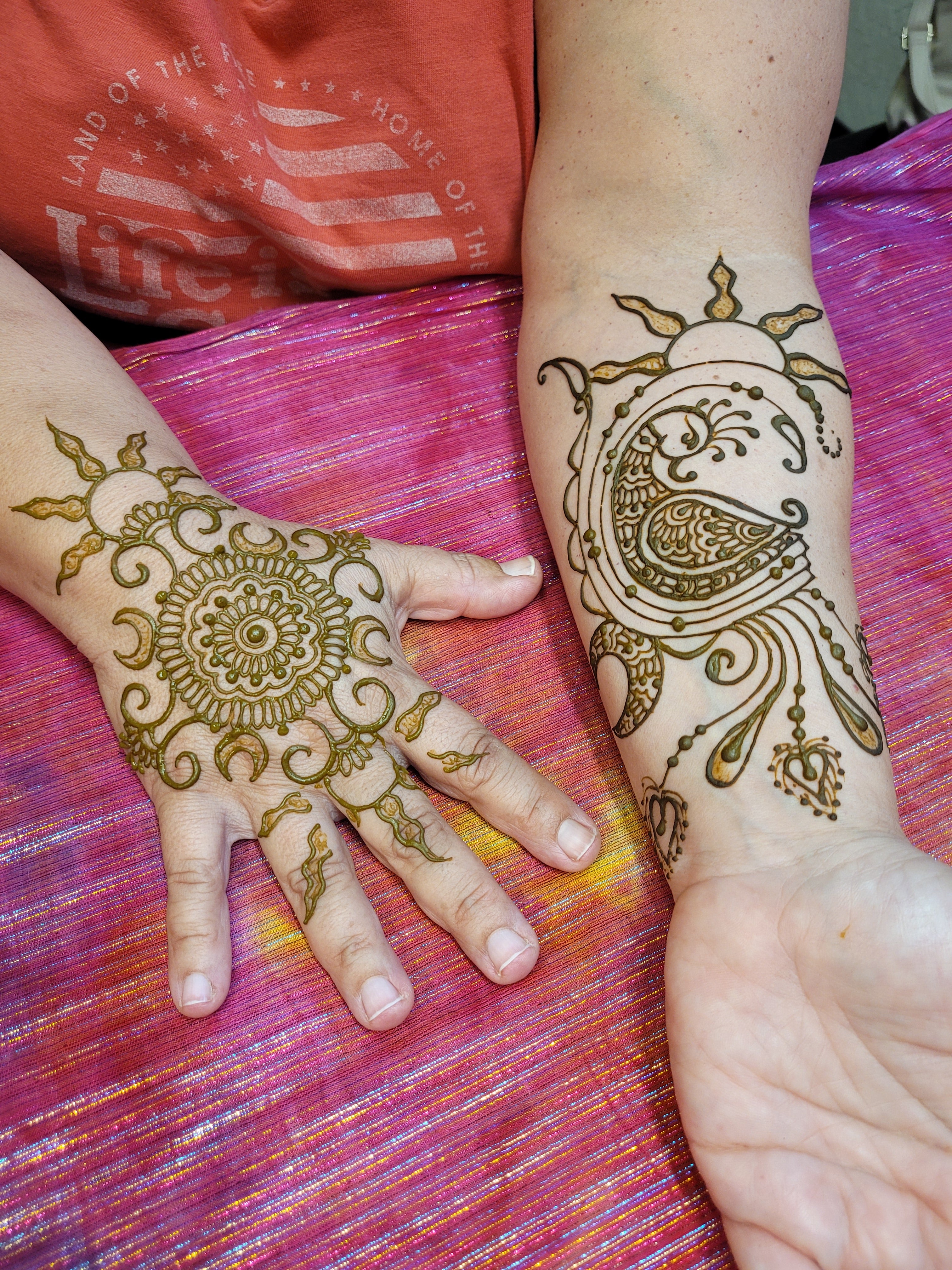
Henna is for Everyone!
We all deserve to feel beautiful and powerful!
